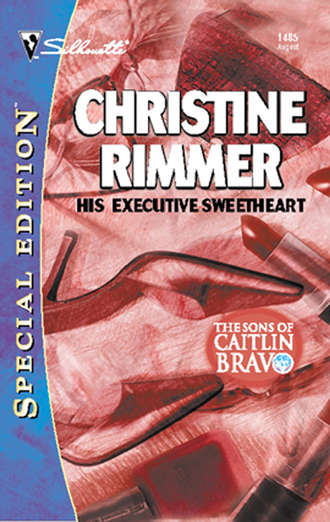
Полная версия
His Executive Sweetheart
Jillian grabbed the bottle and refilled her own glass. “I’m going to ask you again, because I don’t think you really gave this question a chance before. Could he be interested, if he only knew how you felt?”
“No.” Celia sank back against the wall again. “I don’t think so. I really don’t.”
“But you don’t know, not for certain. You’ll never know for certain, not if he never knows how you feel.”
“I’m certain enough.” Celia traced the rim of her glass with her index finger. “I just have to decide whether I can stand this anymore. Or whether I should just…spruce up my résumé and find another place to work.”
Jane and Jillian exchanged looks. Then Jillian said, “But you love that job. You’re making lots of money. You have points in the company. And it’s only going to get better. Aaron Bravo hasn’t gotten where he’s going yet. And until now, you’ve been looking forward to being there when he does.”
“You think I don’t know that?”
“And it’s only been—what—a week since you realized how you feel about him? You don’t need to go rushing into anything too drastic.”
“Jilly, you’re not telling me anything I haven’t told myself at least a hundred times.”
Jane said, “Well, here’s my opinion. Honesty is the best policy.”
Jillian groaned.
Jane looked vaguely injured. “All right, so it’s a cliché. That doesn’t make it any less true.” She pointed a finger at Celia. “Tell him how you feel.”
Jillian slapped the edge of coffee table to get their attention. “No. Hold it. Bad idea.”
“Why?” demanded Jane. “Why is telling the truth a bad idea?”
“Because when it comes to love, you should…never ask a question you don’t know the answer to.”
Jane winced. “And you get paid to give people advice?”
“Well,” Celia reminded Jane, “she mostly gives advice on things like which fork to use and how to get peach-juice stains out of silk blouses.”
“I beg your pardon,” Jillian huffed. “I give advice to the lovelorn, if they write in. I’ll advise on any subject. That’s my job.”
“Scary, very scary,” muttered Jane.
“I heard that,” snapped Jillian.
“Sorry.” Jane adjusted her skirt over her knees.
Jillian said, “I mean it. There’s another way. A better way.”
Celia sat forward eagerly. “All right. What way?”
Jillian cleared her throat. “Absolutely first of all, you have to make him notice you as a woman.”
“Oh,” said Celia, sinking back, disappointed and letting it show. “And how do you expect me to do that?”
Jane stopped fiddling with her skirt. “Oh, my God. I think she’s talking makeover.”
It was an old joke between them. Jillian gave her first makeover when the three of them were twelve years old. Jane was her subject. She cut Jane’s hair and dyed it—green. Jane wore a hat for months.
Jillian sniffed. “Oh, come on. In case you’ve forgotten, I now get paid and paid well to do what you’re groaning about. And I act as an adviser now—an extremely knowledgeable adviser. I let the experts do the actual cutting and coloring. I’ve come a long way from that first haircut I gave you.”
“And a good thing, too,” Jane said.
Jillian pulled a face at Jane, then turned to Celia. “Brighter colors,” she instructed. “Softer, more touchable fabrics. We aren’t talking beating him over the head with you. We are talking subtle, sexy little changes—and I think you ought to bring out the red in your hair. With that gorgeous pale skin, you’d be a knockout. And you’ve got those darling rosebud lips—what are those called, those cute, fat old-time dolls with those darling rosebud mouths?”
“Kewpie dolls,” Jane supplied. “And you’re right—about her lips, anyway. She’s got Kewpie-doll lips.”
“Lips that she never makes anything of.” Jillian sent Celia an I-mean-business scowl. “A deeper, riper shade of lipstick. Are you with me?”
“She’s right,” Jane conceded. “You’d look great in brighter colors. Red hair would be good on you—so would darker lipstick. Go there if you want to. But as far as Aaron Bravo goes, tell him. Three little words. I love you. There is no substitute for honesty. It’s the place where every relationship should start. If you let him know how you feel, you give him a chance to—” The ringing of the telephone cut her off. “Don’t you move.”
Celia slumped among her pillows. “Where would I go?”
Jane uncrossed her legs and stood. She went to the phone on the table at the other end of the couch. “Hi, this is Jane… Yes…” A smug little smile curved her lips. “Of course. Can you hold on? Thanks.” She punched a button in the headset and turned to Celia, one dark brow lifted.
Celia frowned at her. “For me?”
Now Jane was grinning. “Speak of the devil, as they say.”
Celia’s heart started pounding so hard, it felt as though it slammed against the wall of her chest with every beat. It was a very disconcerting sensation. “Aaron?” She more mouthed the word than said it.
Jane nodded.
Jillian let out a short, loud bark of laughter.
“Shh!” Celia reached over and bopped her on the knee. She hissed in whisper, “He’ll hear you….”
“No he won’t,” said Jane. “I’ve got him on Mute—and did you want to speak with him or not?”
Celia shot to her feet and raced to grab the phone. She put it to her ear. “Hello?”
No one answered.
“Here,” said Jane. Celia held out the phone and Jane punched the right button. Celia put it to her ear again, opened her mouth—and shut it. Jane was still standing there, watching expectantly.
Celia made frantic shooing motions. With a sigh, Jane returned to her pillows.
Celia turned away, toward the wide double doors that led to the entrance hall, seeking just a tiny bit of privacy. “Hello. Aaron?”
“Celia. There you are. Good.” He sounded preoccupied, as always. Preoccupied and wonderful. His deep, rich voice seemed to pour into her ear and all through her body, melting her midsection, turning her knees to water.
She asked, quite calmly, she thought, “Is something wrong?”
“Wrong? No.” She heard the telltale clicking sounds that meant he was sitting at a computer. “I was typing a note to Tony Jarvis….” Anthony Jarvis was Senior Vice-President of Project Development. For Aaron, High Sierra was just one step in the road—a big step, but not the only one. Silver Standard Resorts, High Sierra’s parent company, had to keep growing. Tony Jarvis was the main man responsible for scouting future venues. “The note has vanished. Can’t seem to bring it back up.”
She couldn’t help grinning. Since he never typed his own e-mails, he’d forgotten the finer points of the program they used for them.
“Celia. Find my memo.”
She told him what to click on.
“Ah,” he said after a moment. “There it is. Thank you.”
“No problem—Aaron?”
“Hmm?”
“How did you get this number?”
A pause, then, “You’re irritated, that I called you there?”
“Not at all.” Never. Ever. Call me anytime. Anywhere. For any reason… “I just wondered.”
“You said you were going to Jane Elliott’s. I called information. It’s a listed number.”
He’d remembered that she was going to Jane’s! She could hardly believe it. He so rarely remembered anything personal she told him. Her heart pounded even harder, with pure joy. “Oh. Of course. You called information. I should have known….”
“Celia?” He sounded puzzled. “Are you all right?”
“Oh. Yes. Fine. Just fine.”
“Have a good weekend.”
“I will….”
The line went dead. She pulled the phone away from her ear and stared at it, wild joy fading down to something kind of hollow and dejected.
Really, the call had meant less than nothing to him. She had to face that, had to accept it.
Jillian said, “See? He can’t live without you.”
Celia put down the phone. “That is so not the case.” She returned to her spot against the wall, dropped to the floor and flopped back on her pillows.
Jillian was adamant. “He can’t live without you. He just doesn’t know it yet.”
“Tell him,” Jane commanded for the third time that night.
“Give up,” Celia cried. “I’m not telling him. And I’m not changing my hair color, either.”
“Then what will you do?” asked Jane.
“I haven’t decided yet.”
Her friends groaned in unison.
They worked on her all weekend, advising, cajoling, prodding and instructing. They wore her down, little by little.
Jane kept pushing honesty. Jillian talked hair and wardrobe and subliminal seduction. Celia moaned and protested and begged them to let it go. They would, for a while—and then they’d start in again.
She couldn’t hold firm against them forever. And she loved that they listened to her, that they cared. They really were the best friends any woman could have.
By noon Sunday, when she got in her rental car to drive to the Reno airport, she had made a decision.
She would take Jane’s advice and tell Aaron of her love.
Chapter Four
C elia’s course of action seemed perfectly clear to her when she was waving goodbye on that crisp, snowy Sunday in front of Jane’s wonderful old house.
First she would tell Aaron of her feelings. And depending on how he reacted, maybe she’d consider some of Jillian’s suggestions—if she wasn’t too busy nursing a broken heart while pounding the pavement looking for another job.
It was the “if” part that ruined her resolve.
Because how could she help fearing that the “if” part was reality? She would tell him she loved him. And he would tell her, very gently, because he was a kind man at heart, that he was sure she’d be happier working for someone else.
She’d lose him and her job.
All right, she was miserable now. But she was miserable and employed. She just couldn’t see the tradeoff. If she told him, she’d still be miserable. And she’d be out of work, as well.
“Oh, that’s negative.” She’d lie in bed at night, staring up at the dark ceiling, giving herself advice. “I am so negative.” She would tell herself, “Celia Louise Tuttle, you’ve got to snap out this. You’ve got to give it up, get over him—or tell him how you feel.”
Jillian called on Tuesday. “Well? Did you do it? What did he say? How did it go?”
Celia let too long a pause elapse before answering.
Jillian figured it out. “You didn’t do it.”
“I’m trying.”
“Celia. If you’re going to do it, do it.”
“I will, I will….”
“Tomorrow morning. The minute he comes in the door. Look up from your desk and say, ‘I have to speak with you privately about a personal matter.’ Get him to set a time. Have him come to your suite.”
“Oh, God.”
“Better if it’s on your turf.”
Right, Celia thought. Easier for him to get up and walk out.
“You can do it, Celia.”
“Yes. I can. I know….”
The next morning, when he called her in to go over the calendar, she was ready. She truly was. She stood from her desk and she straightened her fawn-colored skirt—brighter colors, hah! Like wearing fire-engine red and Jolly Rancher green could make him love her. She tucked her yellow legal pad under her arm, grabbed her pencil and her miniature tape recorder and crossed to the high, wide door that led to his private office.
She paused there to smooth her hair and tug on the hem of the jacket that matched the fawn-colored skirt. I’m okay, she thought. Pulled-together. Calm. Collected. Ready to do it.
She pushed open the door and there he was, right where she expected him to be, at his big glass desk in front of the wall of windows, engrossed in something on his computer screen.
She quietly turned and made sure the door was shut. Then she marched across the room and stepped between the two black leather visitors’ chairs that faced his desk, planting herself in front of him.
It took him a moment to stop punching keys and look up. His bronze-kissed dark brows drew together. “Celia?”
That was it. All he said. It was way too much. It was, Is there a problem and do we really need to address it right now?
No. They didn’t.
She sidled to the right, dropped into one of the two chairs, indicated her legal pad and chirped brightly, “Ready when you are.”
Jane called next. On Thursday, after midnight. “Did you do it?”
“Oh, Janie.”
“You didn’t.”
“I almost did.”
“But you didn’t.”
“It’s really…hard for me.”
Jane let out a long breath. “Look. I’ve been thinking….”
Celia clutched the phone as if it were a lifeline. “Yeah?”
“Maybe you’re not up for reality right now. Maybe you’re not ready to face him with the truth.” That was sounding pretty reasonable—until Jane went on. “Maybe you’re enjoying this a little, kind of reveling in your misery.”
“Jane!” That hurt. It really did. And partly because it had the sharp sting of truth.
She was getting kind of…used to being miserable. Yesterday was two weeks since V-day. Two weeks of suffering. She’d kind of gotten into a groove with it now, hadn’t she?
“Celia Louise, you are the classic middle child, you know that you are.”
“Is this a lecture coming on?”
“You are a middle child and you know how to be…ignored. Passed over. You don’t get out and make things happen like a first child. You don’t expect all good to come to you, as the baby in the family always does. You…accept being in the middle. You can easily become stuck.”
“And I’m stuck right now, is that what you’re saying?”
“Yes. You’re stuck in the middle, sitting at the trestle table, clutching your sad little bowl of gruel, knowing when you finish it, you’ll still be very, very hungry—and yet unwilling to get up and ask the headmaster for more.”
“My bowl of gruel?”
“Come on. You remember. Dickens. Oliver Twist. In the orphanage. We read it in Mrs. Oakley’s freshman English class.”
She remembered. “Shall we go into what happened when Oliver actually got up and asked for more?”
Jane was silent for a count of two. “Okay,” she conceded. “Bad analogy.”
“No kidding.”
“But in the end, Oliver succeeded in life. Because he was someone who could get up when he had to and ask for more.”
“Hooray for Oliver.”
Jane made a small sound in her throat—one that spoke of fading patience. “I’m merely saying, if you don’t want to tell him, fine. Maybe you should quit working for him. It wouldn’t be the end of the world for you to have to get another job. And at least that would be taking action, which I sincerely think it’s time for you to do.”
There was no getting around it. Jane had it right. “I’ll tell him. I will.”
“Good. When, exactly?”
“Tomorrow…”
Tomorrow came.
Celia went to the office tower a determined woman.
And when she got there, she learned her boss had taken off for New Jersey on a site-scouting trip with Tony Jarvis. He wasn’t due back until Sunday. He’d left her an e-mail.
TO: Celia Tuttle, clerical/PA
FROM: Aaron Bravo, CEO
SUBJECT: Trip to New Jersey
Back Sunday. Take a three-day weekend. Aaron.
And that meant, unless something came up and he really needed her, she wouldn’t see him face-to-face until Monday.
Reprieved, she thought. And felt mingled relief and despair—tinged faintly with worry. As his assistant, it was part of her job to be at his side when he traveled. Why hadn’t he wanted her presence on this trip?
She told herself not to make something of nothing. Now and then, he traveled without her. This was probably just one of those times.
She considered going home for another weekend. But she didn’t think she could bear facing Jane again until she had done what she’d sworn to do. And there were plenty of projects for her to dig into. She worked all day Friday and half a day on Saturday.
Every time she returned to her rooms, she expected to see the message light blinking on her phone—a call from Jane or Jillian to find out if she’d finally done what she’d vowed to do.
But her friends didn’t call. Maybe they’d given up on her. She could hardly blame them if they had.
Sunday, she woke early, thinking, He’s due back today….
But she didn’t know what time.
And what did it matter what time? She wasn’t going to ask him for a private meeting until tomorrow, anyway.
She lasted until noon and then she called his rooms. His machine picked up. Quietly, stealthily—without leaving a message—she returned the phone to its cradle. Then she went to her computer, logged onto the company system, and used her employee code to look up his itinerary. It was unethical, really. Celia Tuttle, secretary/personal assistant didn’t need to know exactly when her boss would arrive back in town. But Celia Tuttle, woman hopelessly in love, did.
He was due in at eight that night. Which meant he wouldn’t get to his own rooms till nine or ten at the earliest.
It helped to know that. Made it marginally easier not to keep dialing his number and hanging up when his machine answered.
The day dragged by on lead feet. She read the Sunday paper, watched a movie on cable, her mind hardly registering what her eyes were seeing. In the afternoon, she called down to Touch of Gold, High Sierra’s full-service luxury spa, and booked the works—mud bath, massage and two-hour facial. Maybe it would help her relax.
It did, while she was down there. And it took up four hours she would have spent stewing. She didn’t return to her own rooms until after six.
The rest of the evening was downright unbearable. As eight and nine came and went, she wondered.
Where was he now?
Had he reached the hotel yet?
Was he already in his tower suite—or was he down in the casino somewhere, or in one of High Sierra’s luxurious bars or fine restaurants, maybe having a last drink with Tony Jarvis, or possibly courting some recently arrived high rollers?
There was no way to know.
And it didn’t even matter. Wherever he was, whatever he was doing, she had no intention of tracking him down tonight, anyway.
She put on her pajamas and she got into bed.
But sleeping fell under the heading, as if.
She reached for the phone more than once. But she never picked it up. She knew that if he answered, the sound of his voice would send her into a mindless state of pure panic. She’d hang up without identifying herself—and he would know who it was, anyway. After all, there was such a thing as caller ID.
Which she should have considered earlier, before she’d made that first call.
Jane was so right, she thought, as the night wore on and sleep never came. Here I am, at the bare trestle table, clutching my sad, half-empty bowl of gruel, afraid to stand up and ask for more….
Not sleeping and worrying all night long did nothing for her appearance the next day. She troweled on the concealer to cover the dark pouches beneath her eyes and she put on her nicest suit, which was pale blue, of a particularly fine-gauge gabardine and usually looked very nice on her.
Today, well, nothing she could have worn would have made her look anything better than tired and washed out. Her hair, which was a color somewhere between blond and auburn, seemed flat and lusterless as a brown-paper bag. Her skin looked pasty.
Really, she couldn’t help thinking that maybe today just wasn’t the day. Maybe she should get to bed early tonight, get a good night’s sleep for a change. And then, tomorrow, when she felt fresh and didn’t look like the walking dead, she could—
“No!” She glared at her own pasty, pale face in the bathroom mirror. “No more excuses. So you look like hell. You’re telling him. Today.”
She was at her desk when he entered the office suite.
“Good morning, Celia.”
Her heart felt as it if had surged straight up into her throat. She swallowed it down and attempted a smile—one that never quite happened.
He was already past her, approaching the door to his private office. “Give me twenty minutes and we’ll go over the calendar.”
By then, her heart had dropped heavily into her chest again and begun beating so hard and loud she was certain any second she’d go into cardiac arrest. She stood.
“Aaron.”
He paused with his hand on the door and turned back to her. He looked puzzled.
Really, now she thought about it, he’d been looking puzzled way too much lately. Probably because she’d been acting so strangely, he couldn’t help but notice, even oblivious as he was to her as anything but a function most of the time.
He was waiting—waiting for her to tell him whatever it was she had stopped him to say.
“I…uh…” Her voice sounded awful. Tight. Squeaky.
“Yes?”
She coughed into her hand, to loosen her throat. And then, somehow, she was saying the words she’d been vowing she’d say. “I need to talk with you. Alone. It’s a personal matter. I wonder if you would mind stopping by my rooms this evening?” Suggest a time, the part of her mind still capable of rational thought instructed frantically. “Uh. About seven?”
He didn’t answer for a count of five, at least. He just stood there, looking at her through those blue eyes that really didn’t give away much of anything. Finally, he said, rather gently, “Celia. What’s this about?”
“I’d rather…wait. To speak with you alone.”
He gestured at the outer office, which was decorated in cool grays and midnight blues and was empty except for the two of them. “No one here but you and me. It’s as good a time as any to talk. Come on into my office now and we can—”
She put up a hand. “No. Really. I’m sorry, to be so vague about this. But I’d much rather we just kept it to business here in the office. I would honestly appreciate it if you’d just come to my rooms this evening. We’ll discuss it there.”
He looked at her for a long time. It was absolutely awful. What could he be thinking? Undoubtedly that she was inconveniencing him. Just possibly that he was going to have call down to human resources and get them to find him another PA.
Finally, he said in what seemed a half-hearted attempt at humor, “Well. Am I busy?”
She managed a pained smile. “Uh. No. Not at seven. Not as of now, anyway.”
“All right then,” he said. “Your rooms. At seven.” He turned from her and went through the door to his office, closing it quietly behind him.
Chapter Five
O nce in his office, Aaron Bravo stood at the door for a moment, his hand on the doorknob, thinking, What the hell is up with Celia?
Then he smelled coffee.
She had it ready for him, as always, waiting on the credenza. He went over, poured himself a cup and drank it right there, staring out the glare-treated glass beyond his desk, not really seeing the city sprawled across the desert landscape below.
He still had Celia on his mind. She didn’t look well. Hadn’t for a week or two now.
So could she be ill? And if so, was it serious? Was she planning to tell him she needed some time off—or worse, that she’d have to give up her job?
Damn. She was young, too young to be dangerously ill. And he’d sure as hell hate to lose her. She was the next thing to a genius at what she did. Always there when he needed her—and yet never in the way.
Pregnant.
The word popped into his head. He frowned. No. Not Celia. Celia didn’t have time to get pregnant, not with the kind of demands he made on her. He kept her working hard—too hard, really. He knew that. He also paid her damn well. And he tried to remember to cut her a little slack now and then. Like this last weekend, when he’d let her off the hook for the trip back east, leaving instructions for her to take three days off.
He poured another cup of coffee.
Re the pregnancy angle—on the other hand, why not? How much opportunity did it take, anyway? One encounter could do it. If she hadn’t been careful.








